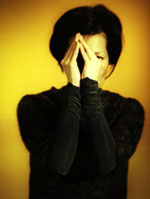Fujiwara Dance: Difference between revisions
No edit summary |
Janet Lumb (talk | contribs) No edit summary |
||
| Line 5: | Line 5: | ||
|Arts=Dance | |Arts=Dance | ||
|Type=Person | |Type=Person | ||
|Aspects= | |Aspects=Developer | ||
}} | }} | ||
''''To dance is to journey into the secrets of intuition, memory, dreams; to encounter and express the mysteries of human nature as they are manifest in the body, before words.''' | ''''To dance is to journey into the secrets of intuition, memory, dreams; to encounter and express the mysteries of human nature as they are manifest in the body, before words.''' | ||
Revision as of 22:35, 21 July 2010
Toronto 43° 39' 12.53" N, 79° 23' 2.16" W Dance Person Developer
'To dance is to journey into the secrets of intuition, memory, dreams; to encounter and express the mysteries of human nature as they are manifest in the body, before words. I believe in the ability of art to move people, to change people, to put people in touch with the best part of their humanity, to remind people of the complexity of their humanity and to cultivate compassion.
Denise Fujiwara
ABOUT DENISE FUJIWARA
2010 marks Denise Fujiwara's 32nd year as a dance artist. She is one of the most diverse talents to evolve on the Canadian dance scene; a sought after choreographer, dancer, teacher, impresario and actor.
She began her interesting career in childhood, as a gymnast, when she competed internationally for the Canadian Rhythmic Gymnastics team. Upon completing an Honours B.F.A. in Dance at York University, she became one of the founders of T.I.D.E. (Toronto Independent Dance Enterprise). Here she was instrumental in the creation of a diverse body of work for the now-defunct but still notorious company that danced across Canada for 10 years.
In 1991 she formed her own company, Fujiwara Dance Inventions, to house the development of her solo projects. To date her six solo dance concerts, Spontaneous Combustion, Vanishing Acts, Sumida River, Elle Laments, Brief Incarnations and Komachi have garnered praise across Canada and have toured to festivals in the United States, South America, Europe and Asia. Her recent forays back into ensemble choreography resulted in Conference of the Birds, a work for 9 dancers and 3 musicians that was called, “– the best thing to premiere at the (fFIDA) festival in many a year”, and NO EXIT, “- so precisely performed it needs no words.” by the Toronto Star. This year she will premiere Lost and Found at Toronto’s DanceWorks. This work has been commissioned by the CanDance Network of Presenters and will tour eastern Canada in the spring of 2010.
Fujiwara’s approaches to the disciplines of dance technique, improvisation, performance and choreography have developed over more than three decades of intensive research, practice and performance. She has had remarkable mentors including Tokyo Butoh master, Natsu Nakajima, Montreal dance pedagogue, Elizabeth Langley, the now disbanded Mangrove Dance Collective of San Francisco, the American theatre director, Anne Bogart, and the late great Canadian choreographer, Judy Jarvis.
In addition to her career as a dance artist, Ms. Fujiwara works in film and television. Walls, a CBC Television documentary about her life and work by celebrated filmmaker Jeremy Podeswa, won the 1995 Gemini Award for Best Performing Arts Program. In 1997 she co-founded the CanAsian International Dance Festival where she is the Artistic Director. Her work with CanAsian promotes the work and development of dance artists from across Canada and beyond.
